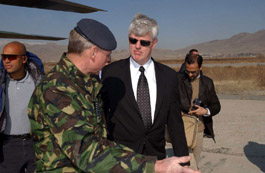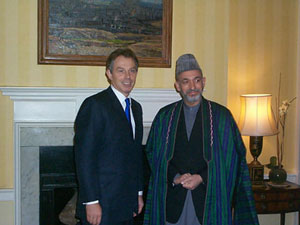
- Afghanistan
- Africa
- Budget Management
- Defense
- Economy
- Education
- Energy
- Environment
- Global Diplomacy
- Health Care
- Homeland Security
- Immigration
- International Trade
- Iraq
- Judicial Nominations
- Middle East
- National Security
- Veterans
- President's Cabinet
- USA Freedom Corps
- Faith-Based & Community Initiatives
- Office of Management and Budget
- National Security Council
- USA.gov
[ Last Chapter | Table of Contents | Next Chapter ]
6. Assistance to Afghanistan
|
Years of civil war, compounded by the Taliban rule and the worst drought in memory, left Afghanistan impoverished and mired in an extended humanitarian crisis. The Coalition has helped the people of Afghanistan to throw off the shackles of the Taliban and the occupying forces of Al-Qa’ida. Through the International Conference on the Reconstruction of Afghanistan in Tokyo the international community demonstrated its long term commitment to Afghanistan. The Coalition is now helping the people of Afghanistan to rebuild their country. |
USA
- As of February 2002 the US has contributed more than $230m in humanitarian assistance for Afghanistan.
- Even before the events of September 11, Afghanistan was the United States' top recipient of humanitarian aid, providing $174 million in fiscal year 2001.
- The U.S. has pledged nearly $300 million in this fiscal year alone for Afghan relief and reconstruction. The international community, including the U.S., has pledged $1.8 billion in aid this fiscal year, and $4.5 billion in aid over the next five years.
- As of March 1, the World Food Programme (WFP), with the support of the U.S. government, had delivered 333,000 metric tons of food into Afghanistan since October 2001. In December alone, the WFP delivered 116,000 metric tons of food—more food than ever before in one month. Despite this tremendous success, there are still people in remote areas who need help. The U.S. government will continue to provide food assistance.
- The U.S. Department of Agriculture (USDA) provided 240,200 metric tons of wheat in fiscal year 2001 and will provide $45 million in food aid this fiscal year.
- USAID is providing more than $117 million in food assistance to Afghanistan in this fiscal year.
- Between October 7 and December 13, the Department of Defense air-dropped 2,423,700 Humanitarian Daily Rations (HDRs) to Afghans.
- The State Department’s Bureau of Population, Refugees and Migration (PRM) already has contributed $20.4 million to assist victims of conflict inside Afghanistan through the International Committee of the Red Cross (ICRC).
- USAID has funded airlifts of critical commodities to Afghanistan. The airlifts have provided shelter materials, tents, health supplies and high-energy food items for people at risk in Afghanistan. Ten medical supply shipments provided enough medical supplies and medicine to support 100,000 people for three months.
- Emergency relief supplies delivered into Afghanistan include more than 75,000 blankets, 200 metric tons of high-energy food items and 10,000 cooking sets. In addition, USAID provided mattresses, clothes, stoves, firewood, lanterns and water containers. USAID funding provided 2,756 tons of cooking and heating charcoal to approximately 96,000 of Afghanistan's most vulnerable people. The U.S. is providing emergency shelter and rebuilding damaged homes of thousands of Afghans.
- Through America’s Fund for Afghan Children, America’s boys and girls donated one dollar each to provide food and medical help for the children of Afghanistan. So far, nearly $4.4 million dollars has gone to provide food, shelter, clothing, medicine, and school supplies.
- As part of its Food-for-Education program, the WFP, with USAID support, the US is distributing food to schoolchildren in several districts of Badakhshan Province, in north-eastern Afghanistan. Approximately 27,000 children and 1,500 teachers and service staff in 50 schools have received a four-month ration of wheat flour. A USAID-funded program is encouraging Afghan women and girls to read by hosting reading classes and improving the country's libraries. USAID is funding the training of the library staffs and supplying more books.
- The U.S. is spending over $10 million to improve health care in Afghanistan. Funds are being used to rehabilitate health clinics, provide primary health care, train community health workers and vaccinate children.
Canada
- Canada has provided Afghanistan with $160 million in humanitarian assistance since 1990, $16 million of which was disbursed after September 11, 2001.
- At the Tokyo Conference on Reconstruction in Afghanistan on January 21 and 22, International Co-operation Minister Susan Whelan pledged a further $100 million for humanitarian aid and reconstruction assistance in Afghanistan.
- Canada provides an average of $12 million per year for humanitarian aid to Afghanistan. The funds support the work of several non-governmental organisations, United Nations agencies and the International Committee of the Red Cross.
|
|
"Canada is part of an unprecedented coalition of nations that has come together to fight the threat of terrorism...I have made it clear from the very beginning that Canada would be part of this coalition every step of the way...all Canadians understand what is being asked of the men and women of our Armed Forces and their families." Canadian Prime Minister, Jean Chretien, 8 Oct 2001 |
UK
- The UK is presently the lead nation in the International Security Assistance Force. It presently has more than 1700 troop deployed with ISAF.
- Between 1997 and September 2001, the UK Department for International Development (DFID) provided over £32 million to the people of Afghanistan for emergency food, shelter, healthcare and water supplies, as well as support for agriculture, mines clearance, education, monitoring and advocacy in relation to human rights, and co-ordination.
- Assistance was channelled through a range of UN agencies, the International Committee of the Red Cross (ICRC) and non-governmental organisations (NGOs).
|
|
"Terrorist groups, criminals, drug dealers and disorderly forces who want to be destructive and spread hate and violence in the world are nurtured by, and hide themselves in, failed states. We always need the capacity to prevent such action and to build efficient modern states that are part of the international community so that it is not vulnerable to terrorist organisations such as those responsible for 11 September." Clare Short, UK International Development Secretary,
|
- Since September 11th DFID has contributed £60 million for UK humanitarian assistance. Funds have been allocated to UN agencies (almost £37 million), the Red Cross movement (£5 million) and various NGOs.
- Of this money over £4 million has been channelled into Quick Impact Projects (QIPs) since January 2002. QIPs are designed, as a contribution to the wider international effort, to quickly demonstrate the substantial peace dividend in seeing the Interim Authority as a positive development for the future peace and stability of the country.
- Allocations have been made to agencies as follows:
- £6 million to the International Organisation for Migration (IOM) for projects in Afghanistan, and to identify Afghan professionals to assist recovery;
- £5 million to the Red Cross Movement: £3 million to ICRC and £2 million to the IFRC for protection and relief activities;
- Approximately £12 million to the NGOs for immediate humanitarian and recovery assistance to vulnerable Afghans inside Afghanistan or who have become refugees
- £5 million for quick impact recovery projects; and £2.2 million for direct operations by DFID in support of international humanitarian agencies.
- Allocations to UN agencies include technical personnel, logistical and other material support. This includes: expert personnel for Mr Brahimi’s office; a site planning specialist to UNHCR; two specialists to OCHA to set up a Humanitarian Information Centre; four air operations advisers to UNHCR and WFP; and a nutrition specialist to UNICEF.
- A DFID Field Support Team was deployed to assist the UN in re-establishing its office in Mazar-e-Sharif. DFID has also opened an office in Kabul, in addition to its long-established regional hub in Islamabad and temporary staff deployments to other countries neighbouring Afghanistan.
- At the Tokyo conference, the UK announced a further pledge of £200 million assistance to Afghanistan over the next 5 financial years.
Germany
- At the request of the interim authority in Kabul the German Government is assisting in the rebuilding of the Afghan police forces by providing training and equipment. It presently has more than 330 troop deployed with ISAF
- In January 2002 Germany became the first foreign nation to have its ambassador fully accredited by the interim administration in Kabul.
- Germany has underscored its commitment to averting humanitarian disaster and to securing lasting political stability in the region, most recently with a pledge of $278 million in aid over the next four years for the reconstruction of Afghanistan
- In Tokyo, Germany pledged $69.4 million in 2002 and a total of $278 million for reconstruction efforts over the next four years. The combined European Union contribution of $550 million makes up more than 30% of the total pledged by all nations at the Tokyo conference to assist Afghanistan in 2002.
- Germany was one of the first nations to contribute to the Afghanistan Interim Authority Fund, a trust fund within the UN framework set up to support the work of the Interim Government, with a contribution of $1.7 million in early January 2002.
- Germany provided $46.2 million in humanitarian aid and development-oriented assistance to Afghanistan in 2001, the same year it held the chairmanship of the Afghanistan Support Group, a co-ordination mechanism for humanitarian donors.
- Germany served as host of the UN Talks on Afghanistan on the Petersberg, which concluded on December 5, 2001, and produced the -Bonn Agreement,- a blueprint for the political stabilisation of Afghanistan over the next three years
Italy
- As of February 2002 Italy has contributed more than $33m in humanitarian assistance for Afghanistan.
- It presently has more than 350 troops deployed with ISAF.
Finland
- Finland participated in the donors pledging conference in Tokyo and made a three year pledge of 10 million euros annually. The 2002 contributions will be divided evenly between humanitarian assistance and reconstruction.
- Finland is planning to send a contingent of about 50 troops, consisting of a special civilian and military co-operation (CIMIC) unit as well as liaison officers.
- As mandated by the UN, the operation aims at keeping peace in the capital, Kabul, and surrounding areas in order to facilitate a safe and secure environment for the interim government of Afghanistan and the assisting UN personnel.
- It is envisaged that the Finnish troops will be involved in the co-ordination of humanitarian assistance and liase with the interim government and various military operators.
Netherlands
- The Dutch humanitarian aid is directed to the people of Afghanistan and the Afghan refugees in neighboring countries.
- In addition to its annual contribution of $ 8 m in humanitarian aid, the Netherlands has pledged almost $ 100 m for humanitarian aid and reconstruction:
- $ 27.5 m (UN donor alert 2001)
- $ 5 m (International Red Cross)
- $ 3 m (Trustfund UNDP)
- $ 1 m (UNIFEM)
- $ 62 m (Tokyo Conference)
- The Netherlands is also contributing to the humanitarian aid provided by the European Union, which has a total value of $ 329 million.
- Around 220 Dutch troops participate in the German-Dutch-Austrian-Danish infantry battalion deployed in Kabul in the framework of ISAF. These troops will stay in Afghanistan for a period of six months.
Sweden
- Humanitarian and reconstruction assistance amounting to $100 million, for the period 2002-2004.
- In Tokyo they pledged over $13m.
Japan
- Japan was a co-Chair and hosted the conference to help reconstruct Afghanistan. As of February 2002 Japan has contributed more than US$90m in humanitarian assistance for Afghanistan.
Jordan and Saudi Arabia
- Jordanian troops have set up a hospital at Mazar-e-Sharif.
- In the Tokyo conference Saudi Arabia pledged more than $12m to Afghanistan
Afghanistan
|
|
|
"Afghanistan could have not been freed from the occupation of terrorism, from the presence of terrorism, without the help of the friends that we have, without the presence of your troops there, without the sacrifice that they made and without the contribution that you made to Afghanistan's liberation." Hamid Karzai, Chairman of the Interim Administration of Afghanistan,
|
[ Last Chapter | Table of Contents | Next Chapter ]





